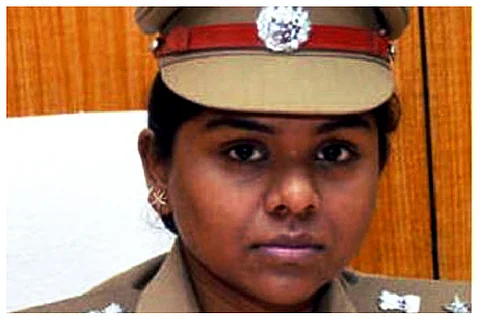The good cop: Meet Ramya IPS, one of the three women officers fighting sexism in cinema
IPS officer and SP of Coimbatore district Ramya Bharathi had recently spoken about the influence of cinema as a major factor in crimes against women along with her colleagues S Lakshmi (DCP, Coimbatore city) and Disha Mittal (DCP, Tiruppur city).
The three women police officers, through a video made by Covai Post, made an appeal to filmmakers, actors, and the audience not to promote films that glorified violence against women.
‘Films start a trend’
Speaking to The News Minute, SP Ramya Bharathi said, "I was having a cup of coffee with my friend when she played some songs. Some of those lyrics were so vulgar. We started talking about the way in which films portray women and that's how we ended up doing the video. These filmmakers think that this is what sells, they believe people's tastes to be so low but it's not true. They make films like this and start a trend. That's when we decided to put up our collective opinion."
Ramya firmly believes that today, films are the prime reason for instigating violence against women.
"We're dealing with these situations in real time on a day to day basis. How much movies have impacted youngsters, college and school kids - we're able to see for real. From the worst cases of violence to more subtle ones, there is an influence," says Ramya.
However, whenever discussions on influence of cinema on violence against women take place, there are many who defend such portrayals by claiming that there is no research to support the correlation.
"When we investigate, or interrogate, we don't go about recording that the suspect was inspired by this hero from such and such film. We don't put it on paper that the accused was motivated by all this to do the crime...because this does not have any implications on the trial or arrest. But I can tell you that even a small crime like a petty theft is often influenced by films," asserts Ramya.
An appeal to women actors
Ramya points out that even when the police or any other government department wants to reach out to the public with a message, they turn to actors - "What they say and what they do really reach the audience. When you have such an influence, why do you show women in such a derogatory way? Why use such filthy language? Your entertainment can be clean and decent. The reason why the video got such a response is because a lot of people endorse our view. There are very few films that you can watch as a family these days. Even on TV, you can't watch a film without an item song in between."
Ramya added that their appeal was also to women actors who perform in such films.
"This is an appeal we're making that goes beyond policing. Of course, we're there to ensure safety and protection to women but these are also factors which need to be considered. It's a moral obligation that we're putting forth. You can be agents of social change, why don't you be that?" Ramya asks.
The three IPS officers had stressed on films influencing the youth in particular. Asked if juvenile criminals were often inspired by cinema, Ramya says, "There are many factors which lead to juvenile delinquency - especially poverty. But when young people see something validated in films, the hero becoming celebrated because of something violent that he did, they think it is all right to do it in real life also."
Changing nature of crimes against women
But haven't there always been crimes against women, why blame cinema now?
Ramya says that the nature of crimes against women has changed over the years. With greater social mobility, there are more women in public spaces than before. While previously, crimes like dowry harassment took centre stage, it's now complaints about stalking and street sexual harassment that have gone up. Also, Ramya notes that films did not degrade women so aggressively and explicitly earlier. The "soup boy" phenomenon is more recent.
However, Ramya points out that though more and more women are coming forward to complain, many don't want to take it beyond scaring the harassers off.
"I've come across many cases where films have inspired violence against women when it comes to "love". When the woman is not interested, the men are not able to accept it. The Swathi case is an example of this taken to the extreme. Many a time, the women just want us to scare them away - so all this doesn't get recorded," says Ramya.
The NCRB and SCRB data may therefore not capture the extent to which such crimes take place.
Sensitising the police force
However, one of the reasons why crimes against women continues to be under-reported is the patriarchal setup of the legal system, with the police force itself indulging in slut shaming and victim blaming. What about changing this?
Ramya acknowledges that there is such a problem: "This is a very pertinent question. Sometimes, the police does go overboard. But we have taken steps to ensure that the victim's dignity is protected properly. In many cases, we got to know that complaints don't come to us mainly because they feel they will not get proper treatment in the police station or after that."
Ramya goes on to detail the measures that have been taken to safeguard the interests of the victims in such cases: "These days we have victim counselling, specific experts who're attached to the department and deal with crimes against women and children in as sensitive a way as possible, crimes against women are recorded only in all women's police station and these officers are sensitized - they have a counsellor, too. It's not handled like an ordinary complaint. We maintain anonymity - officers who handle such crimes are given periodical training on how to handle these complaints."

